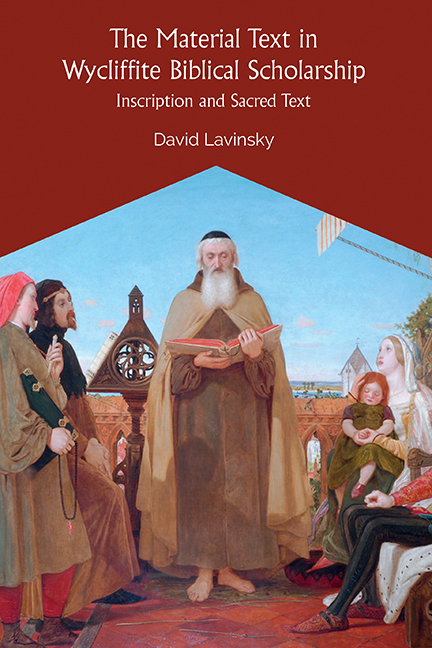Book contents
- Frontmatter
- Dedication
- Contents
- List of Illustrations
- Acknowledgements
- Abbreviations
- Introduction
- 1 “De Pellibus Bestiarum”: Scripture, Realism, and Material Form
- 2 “Stories of þe elde testament”: Adherence, Supersession, and the “Proces” of Reading
- 3 “We speke not of enke and parchemyn”: Voice, Form, and Textual Supplement
- 4 Rolle's “blessyd boke”: Heresy, Interpolation, and the Material Text
- 5 The “sentence of olde holy doctouris”: Gospel Commentary and the Materialities of the Literal Sense
- Conclusion
- Select Bibliography
- Index
1 - “De Pellibus Bestiarum”: Scripture, Realism, and Material Form
Published online by Cambridge University Press: 14 June 2019
- Frontmatter
- Dedication
- Contents
- List of Illustrations
- Acknowledgements
- Abbreviations
- Introduction
- 1 “De Pellibus Bestiarum”: Scripture, Realism, and Material Form
- 2 “Stories of þe elde testament”: Adherence, Supersession, and the “Proces” of Reading
- 3 “We speke not of enke and parchemyn”: Voice, Form, and Textual Supplement
- 4 Rolle's “blessyd boke”: Heresy, Interpolation, and the Material Text
- 5 The “sentence of olde holy doctouris”: Gospel Commentary and the Materialities of the Literal Sense
- Conclusion
- Select Bibliography
- Index
Summary
The history of universals is a history of the logos.
– Alain de LiberaAnd God said: Let the earth bring forth the living creature in its kind [in genere suo], cattle and creeping things, and beasts of the earth, according to their kinds. And it was so done.
– Genesis 1:24[O]ne should note that when it comes to the substance of the faith, individual manuscripts are of no greater value than the beasts from which they were made. Their true worth rests in the sense and truth which they signify. For if this were the case, then were they burned or otherwise destroyed the faith would perish.
– John WyclifWhen the Reverend Josiah Forshall and Sir Frederic Madden published the first complete edition of the Wycliffite Bible in 1850, the format they adopted, in which parallel columns allowed for comparison between an earlier version of the text and a later one, encouraged scholars to pursue a range of questions about the movement's translation practices. This arrangement was of particular interest with respect to the shift from a syntactically inflexible early version of the Bible to a more supple and fluent late version. Whereas the early version carries Latin word order and syntax over into English, the late version eschews exact transposition, striving instead for a translation more accessible to the lay reader – what Wycliffites repeatedly call the “open” biblical text. The idea of scriptural openness or intelligibility is most recognizable, perhaps, in connection to Jerome, who defended his choice to correct the Latin Bible in such a way that it would convey the sense derived from Hebrew and Greek originals. Wyclif, though not a biblical translator like Jerome, shared with patristic writers the conviction that the word of God was not confined to any one language, and therefore that biblical translation was possible so long as the translator captured the divinely intended sense of obscure words and passages. In fact, he had gone further than Jerome, whose attempts to recover what he called the hebraica veritas suggested a clear hierarchy among the tres linguae sacrae (Hebrew, Greek, and Latin).
- Type
- Chapter
- Information
- The Material Text in Wycliffite Biblical ScholarshipInscription and Sacred Truth, pp. 23 - 66Publisher: Boydell & BrewerPrint publication year: 2017



